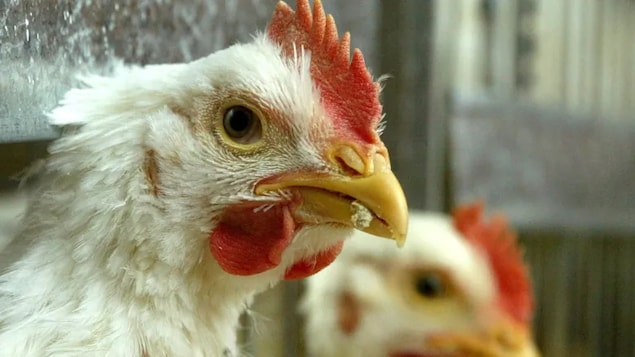Since October, several cases of bird flu have already been recorded in these two cities.
Currently, the CFIA has identified 41 locations in Canada where cases of highly pathogenic avian influenza have been detected. British Columbia is the province with the most cases, which have affected about 37 locations.
Last week, a British Columbia teenager was admitted to hospital after contracting bird flu. This is the first time a human has contracted a known case of bird flu in Canada.
The teenager, who lives in the Fraser Valley area, first went to hospital on November 2 with a range of symptoms including conjunctivitis, fever and cough.
Electron micrograph of H5N1 avian influenza virus (pink) cultured in Madin-Darby canine kidney epithelial cells.
Photo: CDC et NIAID/Flickr
He was first sent home, but was then admitted to Vancouver Children’s Hospital on Friday, November 8 after testing positive for bird flu, which was confirmed by the National Microbiology Laboratory in Winnipeg.
The World Health Organization says the bird flu virus has been circulating widely among wild birds and poultry for more than two decades, but infections in humans are rare.
In order to reassure the population, the Canadian Food Inspection Agency (CFIA) reported on its website that people cannot become infected with the avian flu virus by eating well-cooked poultry, meat or eggs.
Fuentes: RC / PC
Adaptation: RCI / R. Valencia
How can the general public stay informed about potential risks related to bird flu and take appropriate precautions?
Introduction:
Good day, everyone. I am the interviewer from world-today-news.com and today we have two guests with us, Dr. David Johnson, an infectious disease specialist, and Mr. John Smith, a poultry farmer from British Columbia. Thank you both for joining us today. Our topic of discussion will be the recent outbreak of bird flu in Canada and its impact on public health and the agricultural industry.
Dr. Johnson, can you tell us more about the current situation with the bird flu outbreak in Canada and its potential risks to human health?
Dr. Johnson: Certainly. Since October, several cases of bird flu have been recorded in Canada, with British Columbia being the province most affected. Last week, a teenager from the Fraser Valley area was hospitalized after contracting the H5N1 strain of bird flu, which is the first known case of human infection in Canada. While the risk of transmission to humans is still low, it’s important to take precautions when handling sick or dead birds. It’s also essential to practice good hygiene measures and cook poultry thoroughly to prevent the spread of infection.
Mr. Smith, as a poultry farmer, how have these cases of bird flu affected your farm and the wider agricultural industry in British Columbia?
Mr. Smith: As you can imagine, the news of the bird flu outbreak has been concerning for everyone in the poultry industry. We’ve had to take strict measures to protect our flocks, including restricting movement and isolating them from other birds. The CFIA has identified 37 locations in British Columbia where cases of highly pathogenic avian influenza have been detected, which has led to some farms having to depopulate their flocks to contain the spread of the virus. This has had a significant economic impact on many farmers, as well as on the food supply chain. It’s important for consumers to know that properly cooked eggs and poultry are safe to eat and there’s no risk of transmission through consumption.
Dr. Johnson, what precautions should people take when dealing with birds and poultry, especially those affected by the bird flu?
Dr. Johnson: The risk of transmission from avian influenza to humans is typically related to direct contact with infected birds


